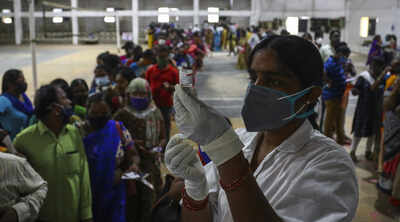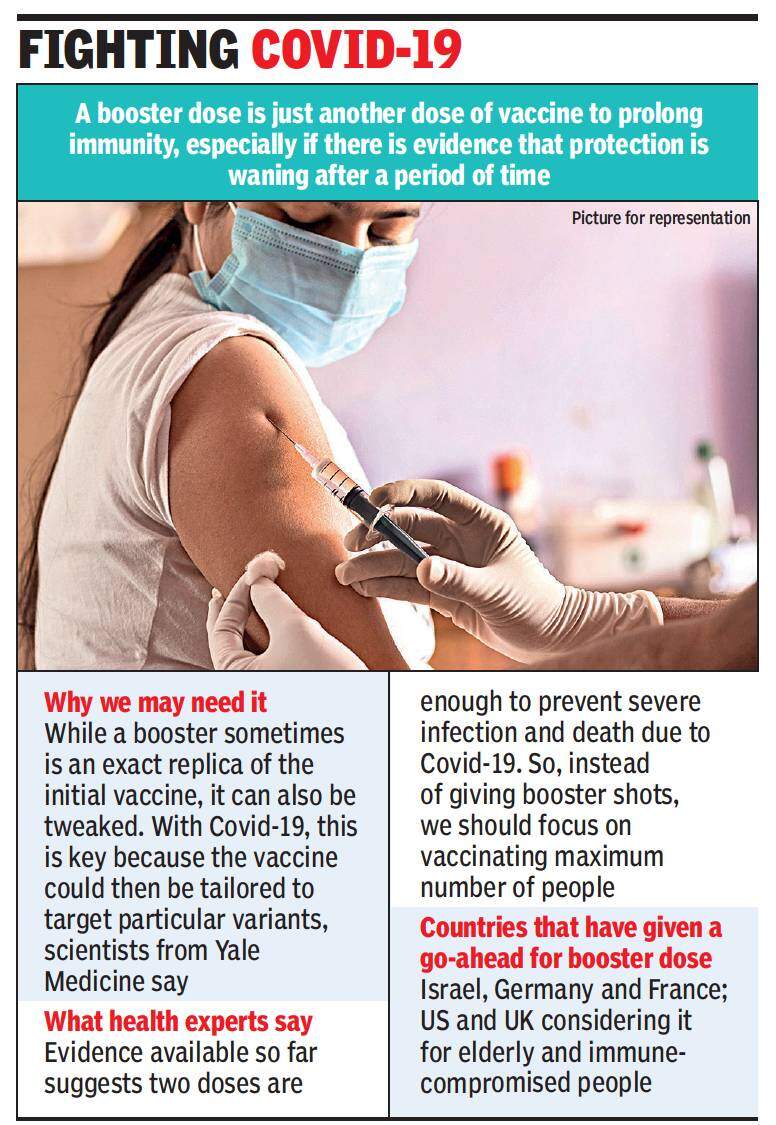Top Searches
- News
- City News
- delhi News
- Covid-19: Give booster dose? Experts say first vaccinate majority
Covid-19: Give booster dose? Experts say first vaccinate majority

NEW DELHI: A majority of India’s population is yet to receive both doses of the Covid-19 vaccine. However, a debate has started already on whether those who received both doses need a booster dose. Vaccine manufacturers claim a booster dose may be needed for two reasons: to provide prolonged immunity and to fight off the mutant variants of the novel coronavirus.
Countries like France, Germany and Israel, where a significant population have received both doses of the vaccine, are considering a third dose as are the US and UK.

Public health experts in India, however, say there is no need to follow suit. Dr S K Sarin, director, Institute of Liver and Biliary Sciences, told TOI that many healthcare workers and other vaccine recipients approach him complaining that their antibody count is low even after full vaccination. “We tell them that antibody response is just one of the markers of the protection offered by vaccination,” said Sarin. “There are other factors at play too.”
Dr Sarin did add, however, that it would be prudent to start multiple trials at least to assess whether a third, or a booster dose, can help increase the antibody levels.
Dr Randeep Guleria, director, AIIMS, said there wasn’t enough data at the moment to support the requirement for a third or booster dose. “By now we know that vaccines cannot prevent transmission of the infection. They protect against severe disease and mortality. Two doses of all vaccines available currently are sufficient to achieve that,” he explained.
The World Health Organization has also called for a halt to booster doses until at least the end of September to enable at least 10% of the global population to be vaccinated. “So far, more than four billion vaccine doses have been administered across the world. More than 80% have gone to high- and upper-middle income countries, even though they account for less than half of the world’s population,” pointed out Dr Tedros Adhanom Ghebreyesus, WHO director-general.
It was more important to immunise as many people as possible rather than focus on the issue of a booster dose, felt K Srinath Reddy, president, Public Health Foundation of India. “We do not know if a booster dose is needed or what it will achieve. But we know for sure that even a single dose offers significant protection to people against severe infection and death due to Covid. Therefore, we must focus on that,” Reddy asserted.
Havin started vaccinating people in January, India had, until Friday, administered approximately 50 crore doses across the country. In Delhi, 1.05 crore doses had been administered.
Independent epidemiologist Chandrakant Lahariya noted that the second wave of the pandemic in India between April and May was caused mainly due to the Delta variant which has now spread to various parts of the world. “Any decision on vaccination should depend on two key criteria: scientific rationale and operative feasibility. The necessity of a third dose doesn’t fulfil any of them,” said Lahariya. “There is neither enough scientific data to support the necessity of an additional dose nor do we have enough vaccines available to experiment with the idea.”
Lahariya also observed that many population clusters in India had already been exposed to the coronavirus. “Antibody responses developed through natural infection last for at least nine months. We should prioritise vaccinating everyone for extra protection to those who are already exposed and those who aren’t instead of focusing on the need for a third dose,” he said.
Countries like France, Germany and Israel, where a significant population have received both doses of the vaccine, are considering a third dose as are the US and UK.

Public health experts in India, however, say there is no need to follow suit. Dr S K Sarin, director, Institute of Liver and Biliary Sciences, told TOI that many healthcare workers and other vaccine recipients approach him complaining that their antibody count is low even after full vaccination. “We tell them that antibody response is just one of the markers of the protection offered by vaccination,” said Sarin. “There are other factors at play too.”
Dr Sarin did add, however, that it would be prudent to start multiple trials at least to assess whether a third, or a booster dose, can help increase the antibody levels.
Dr Randeep Guleria, director, AIIMS, said there wasn’t enough data at the moment to support the requirement for a third or booster dose. “By now we know that vaccines cannot prevent transmission of the infection. They protect against severe disease and mortality. Two doses of all vaccines available currently are sufficient to achieve that,” he explained.
The World Health Organization has also called for a halt to booster doses until at least the end of September to enable at least 10% of the global population to be vaccinated. “So far, more than four billion vaccine doses have been administered across the world. More than 80% have gone to high- and upper-middle income countries, even though they account for less than half of the world’s population,” pointed out Dr Tedros Adhanom Ghebreyesus, WHO director-general.
It was more important to immunise as many people as possible rather than focus on the issue of a booster dose, felt K Srinath Reddy, president, Public Health Foundation of India. “We do not know if a booster dose is needed or what it will achieve. But we know for sure that even a single dose offers significant protection to people against severe infection and death due to Covid. Therefore, we must focus on that,” Reddy asserted.
Havin started vaccinating people in January, India had, until Friday, administered approximately 50 crore doses across the country. In Delhi, 1.05 crore doses had been administered.
Independent epidemiologist Chandrakant Lahariya noted that the second wave of the pandemic in India between April and May was caused mainly due to the Delta variant which has now spread to various parts of the world. “Any decision on vaccination should depend on two key criteria: scientific rationale and operative feasibility. The necessity of a third dose doesn’t fulfil any of them,” said Lahariya. “There is neither enough scientific data to support the necessity of an additional dose nor do we have enough vaccines available to experiment with the idea.”
Lahariya also observed that many population clusters in India had already been exposed to the coronavirus. “Antibody responses developed through natural infection last for at least nine months. We should prioritise vaccinating everyone for extra protection to those who are already exposed and those who aren’t instead of focusing on the need for a third dose,” he said.
FacebookTwitterLinkedinEMail
Start a Conversation
end of article

